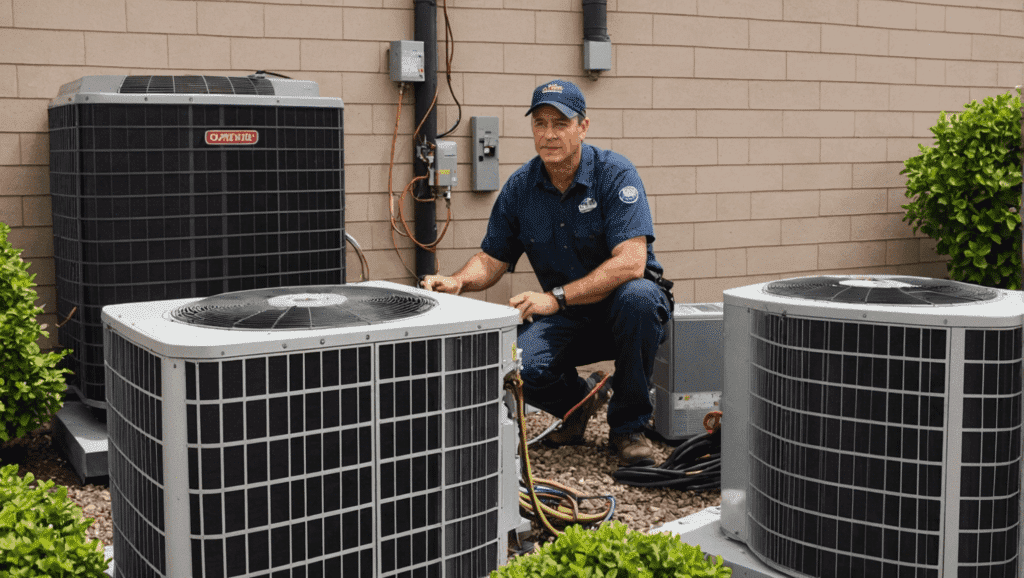Most homeowners never think about their lineset for AC until something goes wrong. But these unassuming copper tubes are the lifeline of your entire cooling system, carrying refrigerant between your indoor and outdoor units. When your AC lineset isn’t functioning properly, your entire system suffers – and so does your wallet.
What Exactly Is a Lineset for AC?
Your lineset for AC consists of two copper tubes that connect your outdoor condenser to your indoor evaporator coil. The larger suction line carries cool refrigerant gas back to the compressor, while the smaller liquid line delivers high-pressure liquid refrigerant to the evaporator. Together, they form the circulatory system of your AC unit.
A properly installed and maintained AC lineset should last the lifetime of your system. However, problems can develop that dramatically impact performance. According to HVAC experts, nearly 30% of AC efficiency problems stem from issues with the lineset for AC that homeowners don’t even know exist.
Common Problems With Lineset for AC Systems
One of the most frequent issues we see involves improper installation of the AC lineset. When installers take shortcuts like using lines that are too long or failing to properly insulate them, the system loses efficiency before it even starts operating. This often leads homeowners to believe they need a new AC unit when really they just need proper lineset for AC service.
Refrigerant leaks are another common problem. Even small leaks in your lineset for AC can cause your system to lose up to 10% of its refrigerant annually. As noted in an article about The Hidden Costs of Delaying AC Repair, small refrigerant leaks often go unnoticed until they’ve caused significant damage to other components like your Motor for Air Conditioning Unit.
Improper sizing is another silent killer of AC efficiency. If your AC lineset is too small for your system’s capacity, it creates excessive pressure that makes your compressor work harder. Conversely, lines that are too large allow refrigerant to expand too quickly, reducing system performance.
The True Cost of Neglecting Your Lineset for AC
Ignoring issues with your lineset for AC can lead to several expensive consequences:
First, your energy bills will steadily increase as your system works harder to compensate for refrigerant loss or improper flow. That same article about The Hidden Costs of Delaying AC Repair reveals that homeowners typically see a 15-20% increase in cooling costs before they realize they have a problem.
Second, your compressor – the most expensive component in your AC system – will suffer premature wear. When your AC lineset isn’t functioning properly, your compressor must work overtime, often leading to complete system failure years before it should occur.
Third, you’ll experience reduced comfort throughout your home. An improperly functioning lineset for AC often leads to uneven cooling, with some rooms never reaching the desired temperature no matter how low you set the thermostat.
Proper Maintenance for Your Lineset for AC
Maintaining your lineset for AC doesn’t require much effort, but it does require awareness:
Regular professional inspections are crucial. During routine AC Maintenance, technicians can check for refrigerant leaks, proper insulation, and signs of corrosion that could lead to future problems.
Protect exposed lines from damage. If any portion of your lineset for AC runs along the exterior of your home, ensure it’s properly secured and protected from lawn equipment, animals, and weather elements.
Monitor system performance. If you notice your AC isn’t cooling as effectively as it used to, or if you hear unusual noises when it runs, these could be signs of lineset for AC issues that need attention.
Consider upgrading older systems. If your AC is more than 10 years old, adding a Kickstart Hard Start Kit can help reduce strain on your compressor caused by aging refrigerant lines.
When to Call a Professional
While homeowners can perform basic visual inspections of their lineset for AC, certain situations require professional AC Repair Service:
If you notice oil stains or green buildup on your lines (signs of refrigerant leaks), you’ll need a professional to locate and repair the leak before recharging your system.
If your system is constantly running but not cooling properly, this could indicate a restriction in your lineset for AC that needs professional attention.
If you’re adding onto your home or replacing your AC unit, you’ll want a professional to evaluate whether your existing lineset for AC is properly sized for the new configuration.
The Long-Term Benefits of Proper Lineset Care
Investing in proper lineset for AC maintenance provides several important benefits:
Lower energy bills are the most immediate payoff. A properly functioning AC lineset can improve system efficiency by up to 15%, according to Energy Star.
Extended equipment life means you’ll get more years from your AC investment. Components like your Motor for Air Conditioning Unit will last significantly longer when not strained by refrigerant flow issues.
Better comfort throughout your home as your system can maintain more consistent temperatures without working overtime.
Reduced environmental impact from refrigerant leaks, which can be hundreds of times more damaging than CO2 emissions when released into the atmosphere.
Seasonal Considerations for Your Lineset
Your lineset for AC needs attention year-round, not just during cooling season:
In winter, ensure any exposed portions of your lineset for AC are properly insulated to prevent freezing. This is especially important if you use a heat pump that operates year-round.
During spring maintenance, have your HVAC technician check refrigerant levels and line integrity before the heavy cooling season begins.
If you switch between AC and Aux Heater systems seasonally, ensure the transition doesn’t put unnecessary stress on your refrigerant lines.
The Connection Between Lineset and Overall System Performance
Many homeowners don’t realize how their lineset for AC affects other system components:
Proper refrigerant flow through your AC lineset helps maintain optimal pressure levels, reducing strain on your compressor.
A well-functioning lineset for AC ensures proper refrigerant superheat and subcooling, which directly impacts your system’s ability to remove humidity from your home.
Efficient refrigerant flow helps your Vents AC deliver cooler air more consistently throughout your home.
Taking Action on Lineset Issues
If you suspect problems with your lineset for AC, here are your next steps:
First, perform a visual inspection of accessible portions of your lines. Look for signs of oil, corrosion, or damage to the insulation.
Monitor your system’s performance. Note any changes in cooling ability, unusual noises, or increases in energy usage.
Consider scheduling professional AC Maintenance if it’s been more than a year since your last service.
For immediate concerns or if you notice significant refrigerant leaks, Contact Us for professional assistance. Small lineset for AC issues are much easier and less expensive to repair before they cause major system damage.
Remember, your lineset for AC is the vital connection that makes your entire cooling system possible. By giving it proper attention, you’ll enjoy lower energy bills, better comfort, and longer system life for years to come.





